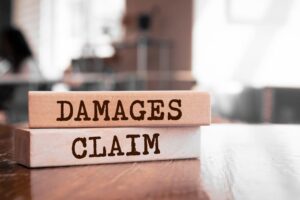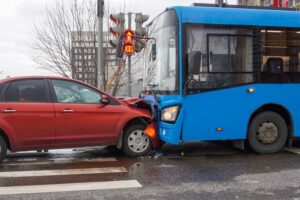Bus accidents often involve more than just damaged vehicles and injuries. Victims may need to sort through a web of corporate policies, government regulations, insurance complications, and multiple parties involved. These cases usually differ from everyday car crashes. More people can be hurt, more legal rules can apply, and the damages can be greater.
Understanding the elements of a bus accident lawsuit early on helps victims build a strong case for compensation. If you or someone close to you got hurt in a bus crash in Virginia, speaking with a bus accident attorney near you for a free consultation can help you take the next step.
What are the key elements required to prove a bus accident case?
To hold someone legally responsible for a bus crash, you need an attorney to show certain elements. These elements form the foundation of any personal injury claim. Without proof in each of these areas, the case might not succeed.
1. Cause / Liability: Someone Did Something Wrong
This part addresses who was at fault and why.
- Negligent Behavior: Was the bus driver speeding, distracted, fatigued, or under the influence? Did another driver cut off the bus or run a red light?
- Violation of Law or Regulation: Did someone violate traffic laws or safety regulations (e.g., improper lane changes, ignoring stop signs, or overloading the bus)?
- Employer or Company Responsibility: Did the bus company fail to maintain the vehicle, hire qualified drivers, or train staff properly?
- Government Liability: If it was a public bus, was the road poorly maintained, or did the municipality contribute to the crash in some way?
Proof can include police reports, eyewitness testimony, dashcam footage, traffic camera recordings, expert analysis, and maintenance or employment records.
2. Damages: You Were Hurt
 This leg deals with the harm you experienced as a result of the crash.
This leg deals with the harm you experienced as a result of the crash.
- Physical Injuries: These could range from broken bones to catastrophic injuries like brain trauma or paralysis.
- Emotional Trauma: Anxiety, PTSD, depression, or fear of riding buses again may also be compensable.
- Financial Losses: Medical bills, lost income, rehabilitation costs, future medical care, or inability to return to work.
Proof can include medical records, bills, photographs, pain journals, employment and wage documentation, expert testimony on future care needs or economic loss.
3. Insurance / Ability to Pay: Someone or Something Can Cover the Loss
Even with clear fault and serious injuries, the claim must be financially recoverable.
- Commercial Insurance: Buses usually carry large policies, especially those operated by private companies.
- Government Insurance or Tort Claims: Public transportation systems often have different procedures and liability caps—claims may need to be filed quickly and through special channels.
- Third-Party Insurance: If another driver or contractor contributed to the crash, their insurance may also be in play.
- Uninsured/Underinsured Coverage: If no other coverage is sufficient, a passenger’s own policy might help.
Proof can include insurance policy information, bus company records, government tort claim procedures, and legal research into coverage limits and liability caps.
Common causes of bus accidents in Virginia
Many bus crashes happen because of preventable mistakes or overlooked problems. Identifying the cause helps determine who’s responsible and how much they owe.
Driver-related factors
Fatigue ranks high among the risks. Some drivers work long hours or skip rest breaks in violation of service-hour rules. Others may get distracted by phones, GPS systems, or passengers. In some cases, drivers lack the right license or didn’t receive proper training.
These issues can lead to poor decisions, slower reactions, or outright recklessness behind the wheel.
Vehicle and maintenance issues
 Buses require regular maintenance. Failing to check brakes, tires, steering systems, and lights can lead to serious problems on the road. Sometimes, defects in the parts themselves, like faulty axles or braking systems, create risks no matter how carefully the bus is driven.
Buses require regular maintenance. Failing to check brakes, tires, steering systems, and lights can lead to serious problems on the road. Sometimes, defects in the parts themselves, like faulty axles or braking systems, create risks no matter how carefully the bus is driven.
Inspection records often uncover whether maintenance was skipped or performed poorly.
External factors
Not every cause is under the driver’s control. Poor road conditions, heavy rain, snow, or black ice can contribute to crashes. Sometimes, another driver causes the accident by swerving into the bus or running a red light.
When weather, road design, or other motorists play a role, fault may spread across several parties.
Who can be held liable in a bus accident case?
Liability refers to who’s responsible for paying damages. In bus crash claims, multiple people or businesses may share that burden.
Bus driver liability
If the driver made a mistake, like speeding, failing to yield, or using a phone, then they may be held personally accountable. However, many drivers operate as employees, so their employer may also be part of the claim. The law generally holds companies responsible for their workers’ mistakes if they occurred during the driver’s normal job duties.
Bus company responsibility
Companies may also face claims for things they did or didn’t do. This includes failing to hire safe drivers, not training staff properly, or skipping maintenance. Virginia law recognizes the idea of “vicarious liability,” which allows injury victims to hold a company responsible when its employees cause harm on the job.
Third-party defendants
Other parties may play a role as well. If a road wasn’t designed or maintained properly, a government agency might be liable. A repair shop could be responsible for faulty work, or a manufacturer might be at fault for a defective part.
Each of these claims requires careful investigation to identify who contributed to the accident and how.
Insurance coverage complexities
Bus companies often carry multiple layers of insurance. Some cover drivers, others cover the vehicle or the company as a whole. Personal policies might also come into play depending on who’s at fault. These overlapping policies can lead to finger-pointing and delays if insurers deny claims or try to shift blame.
What types of evidence are critical in bus accident cases?
Winning fair compensation depends on evidence. The stronger the proof, the more likely the outcome will favor the victim. Certain types of records and witness accounts tend to carry more weight in bus accident claims.
Accident scene documentation
 Police reports often give a neutral overview of what happened. Officers might list suspected violations, witness names, and road conditions.
Police reports often give a neutral overview of what happened. Officers might list suspected violations, witness names, and road conditions.
Photos and videos, whether from cell phones, dash cams, or security systems, help tell the story of how the crash unfolded. Witness statements can also support or challenge the driver’s version of events.
Vehicle and maintenance records
Bus operators must keep logs showing that vehicles were inspected, repaired, and maintained. These records show whether the company followed safety laws. Other documents include driver qualification files and data from electronic logging devices that track driving hours and behavior.
Medical documentation
Proving damages means showing the injuries. Medical records from hospitals, specialists, and therapists help connect the crash to the symptoms.
In some cases, a medical expert might explain how an injury limits your daily life or affects your ability to work. These reports support claims for future care or loss of income.
Unique challenges in Virginia bus accident litigation
Every state handles personal injury claims a little differently. Virginia law includes some rules that may affect how bus crash cases move forward and what compensation is possible.
Governmental immunity issues
Some buses are run by school districts or city transit departments. In those cases, a different legal process applies. Victims often need to send written notice to the government within a set time. These claims may also have caps that limit the amount of money a person can recover.
Federal regulations impact
If the bus crosses state lines or carries commercial passengers, federal rules come into play. The FMCSA sets many safety rules for buses, and failure to follow them can support a claim. Sometimes, a case must address whether federal or state rules apply, especially when it involves long-distance travel or multiple jurisdictions.
Multiple victim complications
Buses carry many people. If several are injured in the same crash, the total insurance coverage may need to be split among them. This can slow down settlements, especially when policies are limited. Lawyers may need to coordinate with other victims’ attorneys to avoid unnecessary delays.
How can a personal injury attorney help with your bus accident case?
Bus accident claims take time, effort, and legal skill. An attorney can provide support in several areas that help strengthen your case and improve your chances of fair compensation.
Case investigation and evidence preservation
Many law firms act quickly to investigate accidents. Some send out teams to gather evidence, talk to witnesses, and preserve physical clues before they’re lost. Attorneys may also work with crash reconstruction professionals and engineers to understand how the collision happened.
Insurance negotiation and settlements
Insurance companies often try to settle for less than what a case is worth. A lawyer can push back with documented losses, expert reports, and negotiation strategies that increase the payout. Some cases involve several insurance carriers at once, making it harder for unrepresented victims to handle.
Trial preparation and representation
If the case doesn’t resolve through settlement, going to court may be the next step. That involves filing documents, preparing witnesses, presenting evidence, and arguing the case before a judge or jury. Most lawyers build the case from the start with trial in mind so they’re ready if needed.
Regulatory compliance navigation
Bus accident cases often involve overlapping safety rules. An attorney familiar with both federal and state laws can identify violations and use them to strengthen the claim.
Statute of limitations for bus accident claims in Virginia
 The law limits how long someone has to file a lawsuit after a bus crash. Missing this deadline can prevent recovery, no matter how strong the case.
The law limits how long someone has to file a lawsuit after a bus crash. Missing this deadline can prevent recovery, no matter how strong the case.
Standard personal injury timeline
Most personal injury claims in Virginia must be filed within two years from the date of the accident. If injuries weren’t discovered right away, the court may allow more time under the “discovery rule.”
If the victim is a minor, the clock usually doesn’t start running until they turn 18, though some exceptions apply.
Government entity claims
If the bus is owned or operated by a city, county, or state agency, special rules apply. Injured parties must give written notice to the government, usually within one year of the incident. This notice must follow strict formatting and delivery rules. Failing to give timely notice may result in the claim being dismissed.
Virginia bus accidents FAQs
How long does a bus accident lawsuit typically take in Virginia?
The timeline depends on several things, like the number of victims, how clear the fault is, and whether the case goes to trial. Some cases settle in months, while others may take more than a year.
What if the bus was operated by a school district or city government?
Claims against public agencies require special procedures. Victims usually must file a written notice within six months and may face limits on how much they can recover.
How much does it cost to hire a bus accident attorney?
Most personal injury lawyers use a contingency fee structure. That means you don’t pay anything upfront. The fee comes from any compensation received after the case resolves.
What should I do immediately after a bus accident?
Get medical help right away, even if you feel okay. Then try to document what happened. Take photos, collect contact details from witnesses, and ask for a copy of the police report. These steps help protect your legal rights and build a stronger case.
Let Allen & Allen fight your fight
Bus accident claims take time, preparation, and a strong understanding of Virginia law. Valuable evidence can disappear quickly, and insurance companies often try to shift blame or limit payments. Allen & Allen knows how to build a strong case, manage the details, and hold the right people accountable.
For more than a century, our firm has stood by injury victims when they needed help the most. We treat your case like it’s our own, and we don’t back down when it comes to seeking justice.
If you or a loved one got hurt in a bus accident, contact Allen & Allen for a free consultation today. Let us fight your fight.



